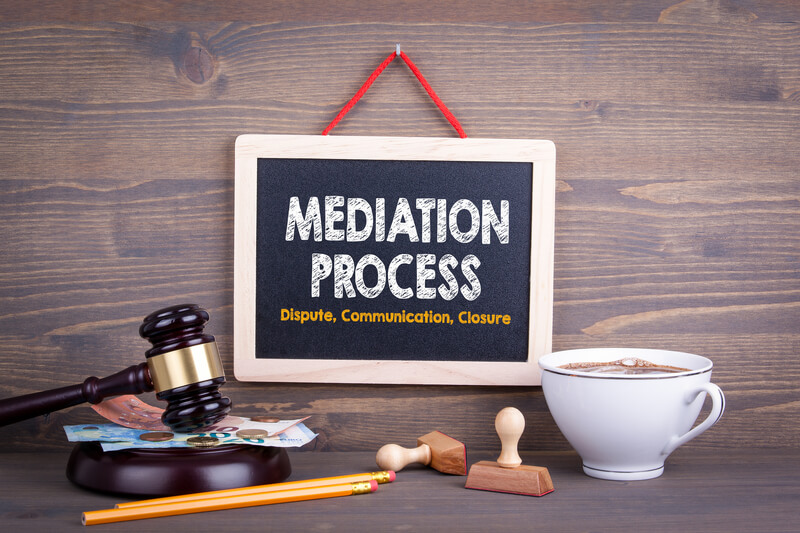The Mediation Process: Step-by-Step
Do you feel you need more clarification about participating in mediation? Let’s learn about the mediation process step by step, as well as find out what mediators do, and do not do.
This style of alternative dispute resolution is a powerful and transformative approach. It offers a compelling alternative to traditional adversarial methods that can be expensive and lengthy. With the guidance of a skilled mediator, you can navigate challenges, overcome impasses, and forge a path toward a mutually beneficial resolution.
Don’t let conflicts linger and escalate. Take action by choosing a path of understanding, cooperation, and long-lasting solutions.
Defining Mediation
Mediation is a structured and voluntary form of dispute resolution. It involves the assistance of a neutral third party to facilitate negotiations. The principles of the process include the following elements:
- Impartiality ensures the mediator allows parties to feel comfortable expressing their perspectives
- Confidentiality keeps the information shared private and creates a safe space for open dialogue
- Self-determination emphasizes that each party has the right to make decisions
Mediation Process: Step By Step
Mediation is popular because it offers several advantages. Firstly, it is more cost-effective and more efficient than litigation or arbitration. It also fosters a more amicable and cooperative atmosphere that preserves relationships. Unlike adversarial approaches, it encourages communication and empathy.
Preparing for Mediation
Recognizing when mediation is appropriate is essential to its effectiveness. For example, you must assess whether the parties want to engage in open dialogue and negotiation. The process can offer a safe space to resolve emotional or sensitive issues. As a result, each party must engage in constructive communication.
Selecting a qualified mediator also plays a pivotal role in a successful mediation. You will want to consider their experience, training, and expertise in your conflict. They should remain impartial, demonstrate active listening skills, and understand the process. You may seek recommendations from trusted sources like your attorney.
Gathering relevant information and documents is also fundamental. A comprehensive understanding of the issues at hand allows the parties to engage in meaningful discussions. Each party should compile pertinent facts, records, and supporting evidence to present their positions.
Initial Consultation
The purpose of the initial consultation is to establish a foundation for the upcoming sessions. It helps participants understand what to expect and their roles in the process. Furthermore, the mediator will describe the ground rules and confidentiality agreements, as well as potential costs of mediation. These essential guidelines promote respectful and productive interactions.
The mediator should outline the various stages and how they work together to reach a resolution. Additionally, this meeting allows them to gain insights into the conflict and tailor their approach. You should feel free to express concerns and ask questions, especially during this stage.
Opening Statements
Each party has an opportunity to present their side of the story. They also outline their concerns, clarify their interests, and identify desired outcomes. These statements help to identify common ground and points of contention.
The mediator may summarize the points made by each party to ensure clarity and understanding. Then, they transition toward the critical stages that follow.
Identifying Issues and Interests
In this phase, the mediator focuses on exploring the interests and needs of each party. They will ask open-ended questions that encourage engagement. Their skills in active listening are vital here. Their insights and inquiries should shift the focus from position bargaining to problem-solving.
Mediators use reframing to make this stage more successful. They will paraphrase statements in a neutral and nonjudgmental manner.
Reframing these issues can also involve active probing. This tactic delves deeper into the concerns and uncovers hidden or unexpressed needs.
Generating Options
This critical phase involves the parties brainstorming potential solutions to the identified issues. The mediator facilitates this process by creating a non-judgmental environment. Ideally, this approach helps to overcome mental barriers and allows people to think outside the box.
Creative thinking often involves looking beyond the obvious and considering novel approaches. Accordingly, the mediator may introduce prompts or scenarios that challenge the parties to think differently. This activity should create space for unique possibilities that may not have been apparent.
Negotiation and Bargaining
This phase is the core of the mediation process. The parties engage in discussions to reach a mutually acceptable conclusion. However, they do not get to pass blame or introduce chaos. The mediator facilitates communication by identifying the potential solutions generated earlier. This process can be intense, so the mediator continues to help reframe differences as opportunities for solutions.
Compromise plays a central role in the negotiation and bargaining stage. The parties need to recognize that achieving a win-win outcome involves some degree of flexibility. Consequently, the mediator guides the parties in exploring different trade-offs to balance their interests.
Reaching a Settlement
Settling involves several crucial steps. First, the parties review the options generated. They may refine and modify them to address their concerns. Then, the mediator produces a document with the agreed-upon terms and conditions. Once finalized, the parties sign the agreement. This is a method of settling a dispute outside of court.
The written statement is a legally binding contract. It provides clarity and certainty about what happens next. Furthermore, it is a point of reference for any future conflicts that may arise.
Ask a Local Lawyer About Mediation Today
Now that you understand the mediation process: step by step, you can see it offers a constructive approach to resolving conflicts. Understanding how it works allows you to appreciate its benefits over other methods.
Regardless, you may want to go through this process with help. Hiring a local attorney to be by your side will help you protect your rights and interests.
Reach out for a referral to a local attorney experienced in mediation. We have representatives available at (866) 345-6784, or you can complete our brief form to get started.

